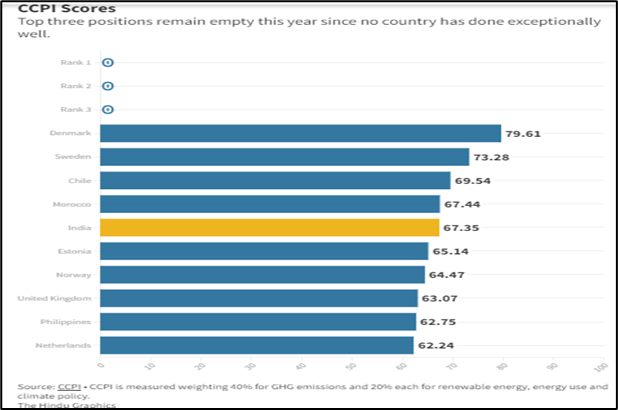At Eighth Spot, India Ranks High on List for Climate Protection: CCPI
26-08-2023
12:23 PM
1 min read

What’s in today’s article:
- About CCPI
- Highlights of the CCPI 2023
- India specific highlights in the CCPI 2023
Why In News:
- Because of its low emissions and rising usage of renewable energy, India climbed two spots to 8th place out of 63 countries in the recently released Climate Change Performance Index (CCPI) 2023.

About the Climate Change Performance Index (CCPI):
- It is a scoring system designed by the Germanwatch - a non-profit, non-governmental organisation (NGO) based in Bonn, Germany.
- It was first published in 2005 and an updated version is presented at the UN Climate Change Conference annually.
- The index aims to improve transparency in international climate policy by assessing and comparing the climate protection performance of 63 nations and the European Union (EU), which account for more than 90% of global greenhouse gas (GHG) emissions.
Highlights of the CCPI 2023:
- The rankings from Germanwatch, New Climate Institute and the Climate Action Network are based on how well countries are doing in halving their emissions by 2030, which is critical to meeting the 1.5-degree Celsius target and avoiding disastrous climate change.
- The report leaves the first three spots empty because no country did well enough in all index categories to earn a very high overall grade. Denmark is ranked fourth, followed by Sweden and Chile.
- China, the world's leading polluter, dropped 13 spots to 51st in this year's CCPI and received an overall very-low grade due to plans for new coal-fired power plants.
- The US climbed three places to 52nd place. The weakest performers were Iran (63rd), Saudi Arabia (62nd), and Kazakhstan (61st).
India specific highlights in the CCPI 2023:
- Overview:
- India earned a high rating in the GHG Emissions and Energy Use categories, while it got a medium rating in Climate Policy and Renewable Energy sections.
- India is on track to meet its 2030 emissions targets, compatible with a well-below 2-degree-Celsius scenario.
- Steps taken by India:
- Since the last CCPI, India has updated its Nationally Determined Contribution (NDC) - national plans to limit global temperature rise to well below 2 degrees Celsius, preferably to 1.5 degrees Celsius in accordance with the Paris Agreement.
- India also announced a net-zero (achieving a balance between the GHGs put into the atmosphere and those taken out) target for 2070.
- Challenges for India:
- India is among the 9 countries responsible for 90% of global coal production and it also plans to increase its oil, gas production by more than 5% by 2030.
- This is incompatible with the 1.5-degree Celsius target.
- The renewable energy pathway is not on track for the 2030 target.
- India is among the 9 countries responsible for 90% of global coal production and it also plans to increase its oil, gas production by more than 5% by 2030.
- Way ahead for India:
- A just and equitable energy transition is required, as is the need for decentralised renewable energy and rooftop photovoltaic capacity.
- A carbon-pricing mechanism, increased capacity at the subnational level, and concrete action plans to meet the targets.

